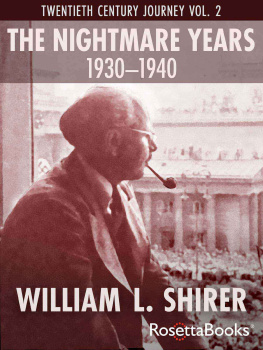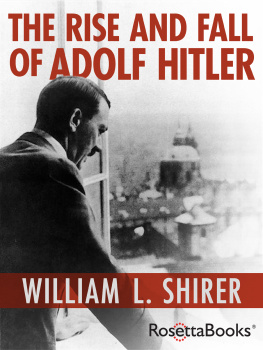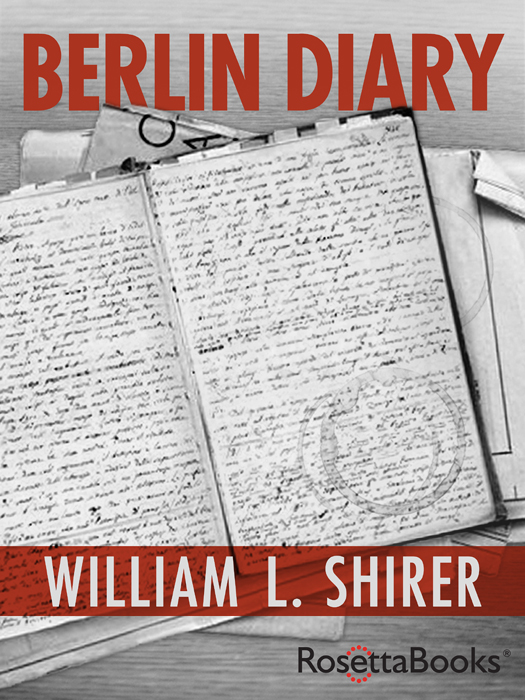William L. Shirer
Copyright
Berlin Diary
Copyright 1941, renewed 1968 by William L. Shirer
Cover art to the electronic edition copyright 2011 by RosettaBooks, LLC
All rights reserved. No part of this book may be used or reproduced in any form or by any electronic or mechanical means, including information storage and retrieval systems, without permission in writing from the publisher, except by a reviewer who may quote brief passages in a review.
Electronic edition published 2011 by RosettaBooks LLC, New York.
Cover jacket design by Alexia Garaventa
ISBN e-Pub edition: 9780795316982
To Tess
Who Shared So Much
Contents
FOREWORD
Most diaries, it may well be, are written with no thought of publication. They have no readers eye in view. They are personal, intimate, confidential, a part of oneself that is better hidden from the crass outside world.
This journal makes no pretence to being of that kind. It was recorded for my own pleasure and peace of mind, to be sure, but alsoto be perfectly frankwith the idea that one day most of it might be published, if any publisher cared to commit it to print. Obviously this was not because I deemed for one second that I and the life I led were of the slightest importance or even of any particular interest to the public. The only justification in my own mind was that chance, and the kind of job I had, appeared to be giving me a somewhat unusual opportunity to set down from day to day a first-hand account of a Europe that was already in agony and that, as the months and years unfolded, slipped inexorably towards the abyss of war and self-destruction.
The subject of this diary therefore is not, except incidentally, its keeper, but this Europe which he watched with increasing fascination and horror plunge madly down the road to Armageddon in the last half of the 1930s. The primary cause of the Continents upheaval was one country, Germany, and one man, Adolf Hitler. Most of my years abroad were spent in that country in proximity to that man. It was from this vantage point that I saw the European democracies falter and crack and, their confidence and judgment and will paralysed, retreat from one bastion to another until they could no longer, with the exception of Britain, make a stand. From within that totalitarian citadel I could observe too how Hitler, acting with a cynicism, brutality, decisiveness, and clarity of mind and purpose which the Continent had not seen since Napoleon, went from victory to victory, unifying Germany, rearming it, smashing and annexing its neighbours until he had made the Third Reich the militant master of the Continent, and most of its unhappy peoples his slaves.
I jotted down these things from day to day. Unfortunately some of my original notes were lost; others I burned rather than risk them and myself to the tender mercies of the Gestapo; a few things I dared not write down, attempting to imprint them in my memory to be recorded at a later and safer date. But the bulk of my notes and copies of all my broadcasts, before they were censored, I was able to smuggle out. Where there are lapses, I have drawn freely upon my dispatches and radio scripts. In a few cases I have been forced to reconstitute from memory the happenings of the day, conscious of the pitfalls of such a method and the demands of ruthless honesty.
And, finally, certain names of persons in Germany or with relatives in Germany have been disguised or simply indicated by a letter which has no relation to their real names. The Gestapo will find no clues.
Chappaqua, New York
April 1941
PART I
Prelude to War
WLS
L LORET DE M AR , S PAIN , January 11, 1934
Our money is gone. Day after tomorrow I must go back to work. We had not thought much about it. A wire came. An offer. A bad offer from the Paris Herald. But it will keep the wolf away until I can get something better.
Thus ends the best, the happiest, the most uneventful year we have ever lived. It has been our year off, our sabbatical year, and we have lived it in this little Spanish fishing village exactly as we dreamed and planned, beautifully independent of the rest of the world, of events, of men, bosses, publishers, editors, relatives, and friends. It couldnt have gone on for ever. We wouldnt have wanted it to, though if the thousand dollars we had saved for it had not been suddenly reduced to six hundred by the fall of the dollar, we might have stretched the year until a better job turned up. It was a good time to lay off, I think. Ive regained the health I lost in India and Afghanistan in 19301 from malaria and dysentery. Ive recovered from the shock of the skiing accident in the Alps in the spring of 1932, which for a time threatened me with a total blindness but which, happily, in the end, robbed me of the sight of only one eye.
And the year just past, 1933, may very well have been one not only of transition for us personally, but for all Europe and America. What Roosevelt is doing at home seems to smack almost of social and economic revolution. Hitler and the Nazis have lasted out a whole year in Germany and our friends in Vienna write that fascism, both of a local clerical brand and of the Berlin type, is rapidly gaining ground in Austria. Here in Spain the revolution has gone sour and the Right government of Gil Robles and Alexander Lerroux seems bent on either restoring the monarchy or setting up a fascist state on the model of Italyperhaps both. The Paris that I came to in 1925 at the tender age of twenty-one and loved, as you love a woman, is no longer the Paris that I will find day after tomorrowI have no illusions about that. It almost seems as though the world we are plunging back into is already a different one from that we left just a year ago when we packed our clothes and books in Vienna and set off for Spain.
We stumbled across Lloret de Mar on a hike up the coast from Barcelona. It was five miles from the railroad, set in the half-moon of a wide, sandy beach under the foot-hills of the Pyrenees. Tess liked it at once. So did I. We found a furnished house on the beachthree storeys, ten rooms, two baths, central heating. When the proprietor said the price would be fifteen dollars a month, we paid the rent for a year. Our expenses, including rent, have averaged sixty dollars a month.
What have we done these past twelve months? Not too much. No great accomplishments. Weve swum, four or five times a day, from April to Christmas. Weve hiked up and around the lower reaches of the Pyrenees that slope down to the village and the sea, past a thousand olive groves, a hundred cork-oak forests, and the cool whitewashed walls of the peasants houses, putting off until tomorrow and for ever the climb we were always going to make to the peaks that were covered with snow late in the spring and early in the fall. Weve reada few of the books for which there was never time in the days when you had a nightly cable to file and were being shunted from one capital to anotherfrom Paris and London to Delhi. Myself: some history, some philosophy, and Spenglers Decline of the West; Trotskys History of the Russian Revolution; War and Peace; Clines Voyage au bout de la nuit, the most original French novel since the war; and most or all of Wells, Shaw, Ellis, Beard, Hemingway, Dos Passos, and Dreiser. A few friends came and stayed: the Jay Aliens, Russell and Pat Strauss, and Luis Quintanilla, one of the most promising of the younger Spanish painters and a red-hot republican. Andres Segovia lived next door and came over in the evening to talk or to play Bach or Albeniz on his guitar.








